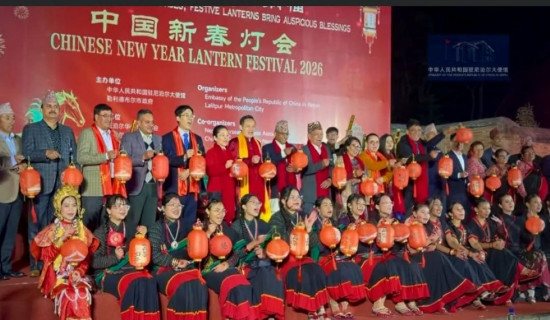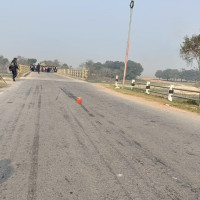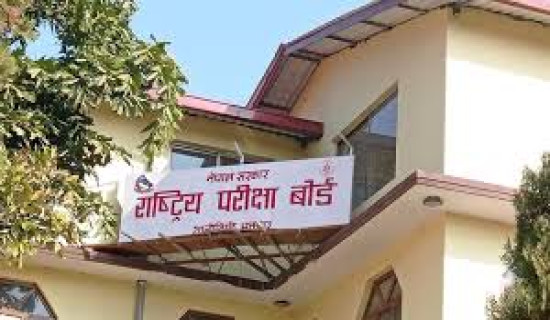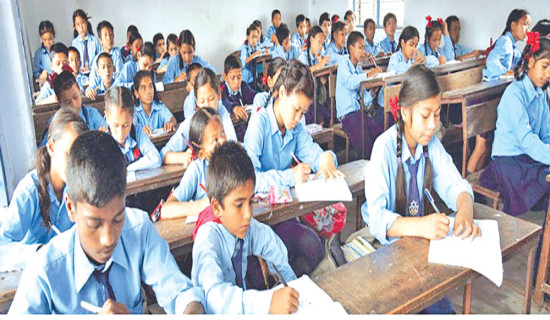- Wednesday, 18 February 2026
Varying Levels of Dashain Ecstacy
Manjima Dhakal
With the end of rainy season, the time for Dashain celebrations is here. The biggest of all festivals in Nepal is celebrated by Hindu people with much fanfare. A total of 10-day long vacations undoubtedly makes Dashain the most awaited festival for many Nepalese, especially students and teachers.
Dashain reinvigorates people of all ages - from kids to elderly Hindu people of Nepal. But, it seems that the scale of happiness is different among children and adults. Dashain joys vary on the basis of age and the class of people. Children seems most happy lot during Dashain in comparison of adults.
Happiest
"When I was a child, the arrival of Dashain would give me a different kind of feeling in my mind. Unknowingly, the scale of happiness picked up during festivities. I thought, clear sky and pleasant weather and vibrant environment herlads Dashain in our society. Even these days Dashain comes every year as it had during my childhood, but I can't get the same degree of happiness now as I used to receive during my childhood." Ramita Neupane, a mother of two kids from Lamjung, shared her feelings regarding Dashain.
Neupane said the scale of happiness started to decrease after she got married. She felt that she could not observe the greatest festival at her husband's house as she used to mark it in her parents' home.
Ramita is only a representative, as every adult harbours the same feeling- the level of joy and happiness decreases as people grow older.
There is no doubt festivals provide revellers with opportunities for getting refreshed as they change the routine of regular monotonous life. Travelling, spending time with family, meeting relatives, having delicious food, especially delicacies of meat, flying kites and enjoying swings are major parts of celebrating Dashain for several Nepali households.
Different activities during Dashain make everyone feel energised and fresh. Many people with advanced age can not feel the same amount of jubilation as they did during their childhood.
In psychology, there is an assumption that happiness diminishes with age because of the responsibilities one has to shoulder, Gopal Dhakal, a psychologist, said.
Psychologist Dhakal said not only in the case of Dashain, matured people are less happy than children in their every day life. The level of happiness becomes low for the people who face financial and social problems. To celebrate the biggest festival, one always needs extra time and money. When the festivities approach, adults feel worried about managing finances so that their families can mark them with joy by managing all needful, Dhakal said.
Dhakal said the head of the family had to undergo many challenges while managing the budget to observe Dashain in full gusto. Mainly poor and middle class family members face such problems.
Getting new clothes to wear, eating delicious food, getting more time to play with friends as schools remain closed for longer periods, travelling to hometowns and villages to meet relatives lead to a spike in happiness level among children.
For children, Dashain is about playing swing, flying kites, being with family, relatives, receiving tika and receiving dakshina ( money) from elders.
Adults Feel Pinch
For adults, with time and age, all activities, things and values pertaining to the biggest festival change. Adults have a responsibility to fulfil all requirements of family members. They are responsible for managing new clothes, foods and dakshina and all the requirements of family members. Therefore, Dashain can create trouble for the head of the middle class and poor family.
There is a saying that Dashain is a means to get happiness and meeting families after a long time and receiving and giving blessings, but for many Dashain could also mean a "dasha" (woe). People who get double extra allowances, have good income, get leave for celebration, are naturally happier than the people who are unemployed or are daily wage earners. They mostly remain unable to manage expenses for celebration.
For rich people, Dashain is an occasion to show off pelf. But, for the poor, it often brings a lot of mental stress.
Apart from managing budgets, adults get worried about managing time for Dashain. Though Dashain is called the festival to celebrate with family members, people who are most busy in their work face trouble in time management. Businessmen, traders and merchants mostly face such problems.
Likewise, housewives who are compelled to spend most of their time cooking get an extra burden during Dashain. Therefore, Dashain can't be the time of making fun related activities for these people.
No matter the status of feeling according to our age or class, we have to celebrate Dashain to the best of our capacity.
Dakshina ( monetary offering) gives more happiness to children whereas Dashain blessings became more important to adults. The holidays are more symbolic of togetherness and relaxation with family members. Dashain gives everyone a reason for being happy, for being together with families and relatives and for enjoying the time with good food.
Therefore, we all have to grab the opportunity given by Dashain. As most children today live in nucleus families, they can spend time with extended family members and get a chance to have a closer look into our culture during Dashain. It can develop a sense of belongingness. Being with friends makes children collaborate and mix up with everyone.
Adults must try to be happy with family by spending money according to our capacity. Likewise, people who have busy schedules must manage time for being with families.
As the period reinvigorates them with new energy and happiness, they should make best use of the period. It helps keep people in sound mental health.
If we can ensure these things, Dashain truly becomes an amazing period for all of us.
(Journalist Dhakal is associated with TRN)
How did you feel after reading this news?

















